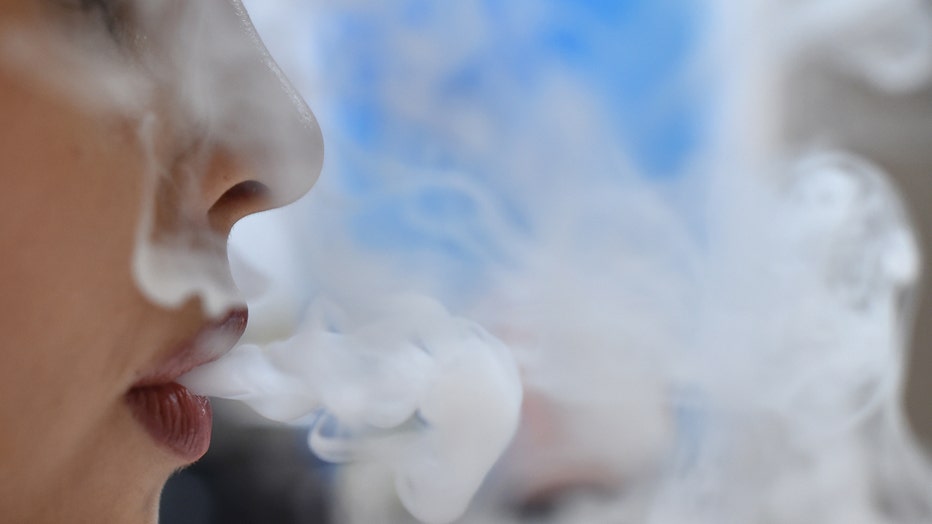US official expects 'hundreds more' cases of vaping illness

US official expects ‘hundreds more’ cases of vaping illness
A House committee held an emergency hearing Tuesday to look at the growing number of deaths and diseases attributed to vaping and e-cigarettes.
WASHINGTON (AP) - The number of vaping-related illnesses in the U.S. could soon climb much higher, a public health official said Tuesday.
Dr. Anne Schuchat, of the Centers for Disease Control and Prevention, told a congressional subcommittee that she believes "hundreds more" lung illnesses have been reported to health authorities since last Thursday, when the CDC put the tally at 530 confirmed and probable cases.
"We are seeing more and more cases each day and I expect the next weekly numbers will be much higher," Schuchat said.
Nine deaths have been reported.
The CDC is investigating the little-understood outbreak but has not yet identified a common electronic cigarette or ingredient.
The cases, which resemble an inhalation injury, have helped trigger a swift backlash against e-cigarettes, including a proposed federal ban on flavors by the Trump administration, state-level restrictions in Michigan and New York, and an end to sales in Walmart stores nationwide.
On Tuesday, Massachusetts ordered a four-month halt to sales of all vaping products and devices. The temporary ban is the first of its kind in the nation. Michigan and New York have targeted their bans to vaping flavors.
Under questioning from House Democrats at the first congressional hearing on the emerging problem, Schuchat emphasized how little is known about the effects of inhaling various oils, flavor particles and other ingredients in vaping products.
"We don't know enough about the aerosol that vaping produces in terms of the short and longer-term health impacts," said Schuchat. "It may indeed be that the process itself is risky."
Many patients reported vaping THC from marijuana, but Schuchat and state health officials have cautioned that some said they only vaped nicotine.
One theory is that counterfeiters started adding something new to knock-off vape products this year. Lab tests of some of the suspect vape products found vitamin E acetate. That lines up with what's known about the additives some counterfeiters are using to "cut" THC oil.
The CDC is recommending people who vape consider not using e-cigarettes at all while authorities investigate.
Subcommittee chairman Rep. Raja Krishnamoorthi slammed Food and Drug Administration regulators for not requiring more testing of nicotine-containing e-cigarettes.
"When a product is released onto the market without safety testing or clinical trials, this is what we fear," said the Illinois Democrat, who chairs the economic subcommittee of the House Committee on Oversight and Reform.

(Photo by John Keeble/Getty Images)
The FDA gained authority to regulate the products in 2016, but repeatedly pushed back the timeline for reviewing their health effects. The current deadline for submitting products is next May.
Lawmakers also heard from the mother of 18-year-old Piper Johnson, who was rushed to the emergency room in mid-August with chest pain, difficulty breathing, coughing and nausea.
Her mother, Ruby Johnson, told lawmakers the problems emerged while driving Piper to start her freshman year of college in Colorado.
"What started as an exciting rite of passage turned into a terrifying near-death experience that involved a weeklong hospital stay," said Johnson, detailing a battery of drugs and medical interventions used to treat her daughter, including oxygen, intravenous fluids, steroids, anti-nausea drugs and pain relievers.
Johnson said her daughter had vaped THC but was mainly using nicotine e-cigarettes such as Juul in the weeks before she became sick.
Johnson, of New Lenox, Illinois, blamed e-cigarette manufacturers for targeting teens with appealing flavors and the FDA for allowing vapes to "proliferate, flourish and remain for purchase," without formal review.
The FDA's acting commissioner, Ned Sharpless, is scheduled to appear Wednesday at a hearing on the outbreak before a different House subcommittee.
Public health officials have labeled underage vaping an epidemic and new survey data shows the problem worsening. Nearly 28% of high school students reported vaping in the last month, according to preliminary CDC figures for 2019. That number is up from 21% last year and 12% the year before.
Krishnamoorthi has been investigating the vaping industry's biggest player, Juul Labs, since April, collecting tens of thousands of internal documents dealing with the company's marketing and business strategy.
The maker of small, pod-based vaping devices has been besieged by scrutiny for its alleged contribution to a dramatic rise in underage vaping. The company faces separate investigations from multiple federal agencies, including the FDA, and state attorneys general.

